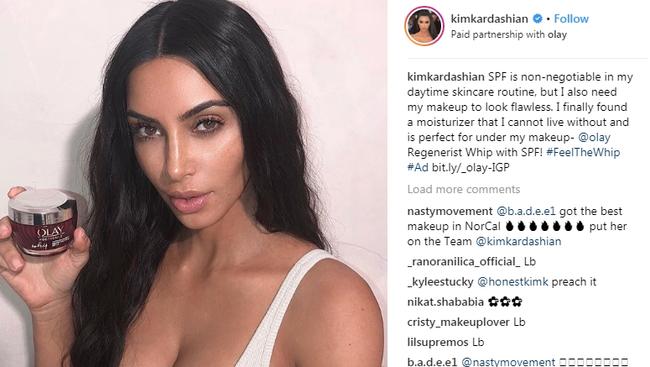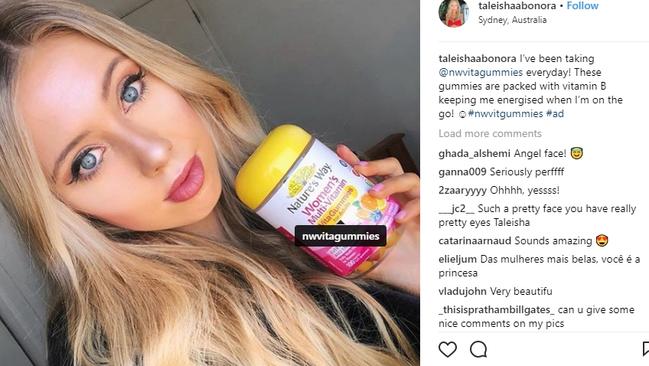When influencers are actually advertisers
INSTAGRAM allows so-called “influencers” to swim in free stuff. But are they all being honest with their followers, asks Maggie Kelly.

Rendezview
Don't miss out on the headlines from Rendezview. Followed categories will be added to My News.
I’VE always enjoyed the study of economics.
There’s something about the “real world” solidness of the equations. Supply and demand. Cause and effect. You sell something, you get paid. You want something, you pay for it. Got it? Good.
Now scrap that, and start again, because today we’re talking about the economics of Instagram — and that’s got nothing to do with the real world.
It goes without saying that social media is developing at a breakneck speed. In a blink, Instagram has gone from merely a photo-sharing platform to a legitimate economy that provides lucrative, full-time wages to its highest performers. These days, you can trade your good looks and clever captions for free travel, free clothes, free houses, free cars, free breast implants … free everything, really.
As a result of this blossoming “collaborative” economy, both Instagram and the Australian Competition and Consumer Commission (ACCC) are scrambling to police what is a grey area between advertising and social media. Is a social media post spruiking a product a person has been sent for free an ad, or is it merely a brag? So fast is social media’s evolution, no one can really keep up. And caught up in the rush is Instagram’s most famous by-product: the “influencer”.

Ever ready to claim a lion’s share of the Insta-economy, the influencer promotes everything from teeth whitening kits to local fashion brands. And good for them. It’s how economics work, right? You sell something, you get paid. But here’s the clincher: they’re not always getting paid.
It’s a known fact that influencers are magnets for free things. They’re routinely gifted products from brands hopeful the influencer will sing their praises to the legions (usually in the tens or hundreds of thousands) of adoring fans out of the good of their hearts. When that doesn’t happen, we stumble into “sponsored post” territory, in which brands with deep enough pockets will simply pay for these kinds of posts.
Recently, new rules were put in place by the Australian Association of National Advertisers that stipulate influencers must tag their sponsored posts with an alert such as “sponsored” or “advertisement” in order to ensure that we normal folk know when they are promoting something in exchange for their own financial benefit as opposed to just giving a shout-out to something they genuinely love (a rule that, it’s worth noting, is often ignored or forgotten about by influencers).
But under the shadow of this Brave New World, a weird phenomenon that has resulted from the gifting process: videos of the influencer unwrapping and showing off these gifts on their “story” timelines, disappearing 24-hours later.
It’s called “unboxing”, and generally shows a bird’s eye view of the influencer declaring they have mail, rifling maniacally through tissue paper, and pulling out
It’s kind of like being stuck on loop on Christmas Day as a kid, watching your older sister open the exact thing you had been asking for all year. Annoying, weird, but not exactly earth-shattering. For the malleable-minded teenage fans of influencers, however, seeing someone you love pull out gift after shiny gift is teaching a dangerous lesson. It’s teaching them that fame means a life of wonderful excess, where every day is Christmas, and you don’t have to pay a cent. That followers and a hot body equals economic power. Gulp.
Genevieve Day runs Day Management, an agency that represents social media influencers. “This is nothing new,” she says of the unboxing trend. “The two have always been related. We’re used to seeing celebrities at the Oscars walking away with gift bags worth thousands, or TV actors being paid to wear a designer. Only now, these people are influencers.”
And while Day is crystal clear on what should happen if one of her clients is paid to promote something, she admits the freebie economy remains opaque.
“We ensure that all of our influencers declare sponsored posts and paid coverage for full transparency. If any money is changing hands there is a signed agreement and you’ll find #spon or similar on their Instagram posts or stories,” Day says.
Sam Kelly of Hello Social, a social media marketing agency, agrees with Day that there are no clear rules when it comes to gifting.

“The guidelines are quite vague, especially in regards to influencer marketing where many different situations, arrangements, and collaborations take place, and the relationship between brand and influencer can take on many forms,” says Kelly.
But what do the influencers themselves think?
Lisa Hamilton is best known by her Instagram moniker, @SeeWantShop, and was one of the original influencers in Australia. Her account, unlike many others, has a clear purpose: shopping. She models clothes, tags the brands, and her follows can then buy them quickly and easily online.
When asked about the unboxing phenomenon, Hamilton agrees that it’s a strange trend.
“I did it [unboxing] a few times and stopped — I was like, this must be so boring to watch! Then people started messaging me and asking where the videos were,” she says.
Hamilton, however, argues that these specific videos shouldn’t be flagged as advertising given that, for her, they are simply a shout-out of thanks to the brands who have sent her free products.
“They aren’t paid, so therefore that’s not an ad. Generally, I’ll write a thank you, and that implies that it’s a gift. But I don’t know about whether it should be tagged,” Hamilton says.
A question was then sent to the ACCC to see if they could provide clarity around the unboxing trend given that influencers and managers seemed to be unsure of where their responsibilities lay: “Should ‘unboxing’ videos, in which an influencer films themselves opening their gifts, be tagged as advertising/sponsored posts?” I asked.
“Is it disingenuous to disguise it as anything apart from advertising?”
The response: “The ACCC does not comment on hypotheticals.”
What the ACCC doesn’t seem to realise, though, is that this is not a hypothetical. Spend 10 minutes scrolling through the Instagram stories of various high-profile influencers and you’ll find video after video of uncredited freebies. And if a coveted item that would otherwise cost money is given to someone for free isn’t that, technically, of financial benefit?
Influencer mail that becomes an unboxing video is a transaction. It’s a fancy version of the shopping channel, only they’ve subbed out ageing game-show hosts with young bloggers in activewear. And in an age where teenagers are surgically attached to their phones, social media is a looking glass into another world. Is this what we want them to learn about how the world works?
Shedding light on what is becoming a deceptive economy is a must if we want to remind the younger generations that nothing in life — even that enviable, tissue-paper wrapped Blogger Mail — ever truly comes free.
Maggie Kelly is a freelance writer and columnist for RendezView.
Originally published as When influencers are actually advertisers


